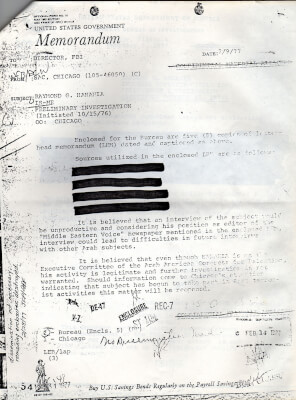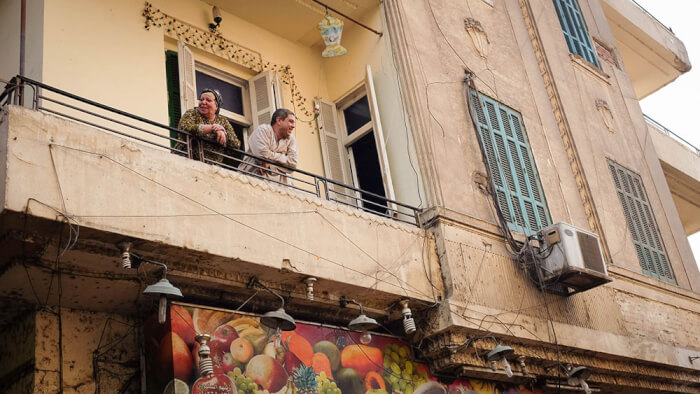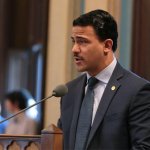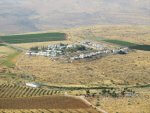Rewriting the future: Editor in Chief Faisal J. Abbas on Arab News’ new leaf
The Arab News Newspaper is the leading English language newspaper in the Middle East, and important title that reflects the focus of much of its editorial content which has been published over the past 43 years. The newspaper has expanded, embraced a new easier-to-read design and is spreading out to new bureaus. Here are perspectives on that overview:
By Faisal J. Abbas
- As a journalist, I don’t think there is any place more interesting in the region than Saudi Arabia: Arab News Editor in Chief
- Arab News will move away from being seen merely as a ‘newspaper’ to a whole array of new offerings
On April 1, a tweet went out from the Arab News account: “Arab News — as you know it — will no longer exist! #AprilFoolsDay #WhatChanged.”
The message was a teaser building up to the relaunch of the English-language daily following a comprehensive overhaul, described by Editor in Chief Faisal J. Abbas as “The biggest shake-up the paper has had throughout its 43-year history.”
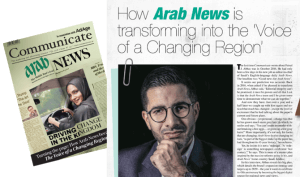
On April 4, the relaunch issue hit the newsstands, with changes also reflected across the digital editions. While the new look and feel of the paper represent a bold departure, many of the shifts have materialized over the past year. In a wide-ranging interview with Communicate magazine, Abbas described the evolution of Arab News since he took the reins in September 2016.
“We went back to our roots and took the paper back from being a local news outlet to its original positioning as the English voice of the region,” he told the magazine.
To achieve this, Arab News, which is owned by the Saudi Research and Marketing Group (SRMG), has opened bureaus in London, Dubai and Pakistan and has hired some of the best industry talent, made significant changes to its workflow structure and rewritten its editorial policy.
The changes are all part of a future plan entitled Arab News 2020 to coincide with the paper’s 45th anniversary that year. Key to this is a “digital-first” philosophy which is incorporating more video and social media to serve the title’s expanding demographic in the online sphere, though with print revenues at 90 percent, it won’t be killing its print editions any time soon.
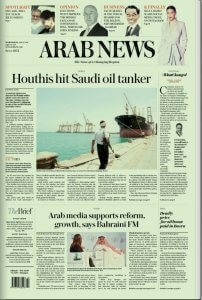
Instead, the focus is on expansion. “We are moving away from being recognized as merely a “newspaper” to a whole array of digital offerings, events and tailored products,” Abbas said.
Examples include the Arab News partnership with YouGov, producing material that “quickly became a reference for the region,” on major events, including polls on lifting the ban on female drivers in Saudi Arabia and a 2017 survey on British attitudes toward the Arab world — cited in the UK Parliament.
The paper’s metamorphosis coincides neatly with the transformation taking place in Saudi Arabia as the country embraces an ambitious reform program as part of the Vision 2030 which, among other things, is redefining the local media industry.
“As a journalist, I don’t think there is any place more interesting in the region than Saudi Arabia,” Abbas said. “We are very lucky to be at the heart of (the) change.”
Arab News bureaus shaping the future of Middle East journalism and beyond
-
The first Arab News bureaus to open outside of Saudi Arabia were in London, Southeast Asia and Dubai
-
Most regional stories have an international dimension and Arab News has expanded to reflect that
By Youssef Khazem
JEDDAH: “Arab” news, for better or for worse, is rarely solely confined to the region.
From the bloody conflict in Syria and the Israeli-Palestinian conflict, to the investment moves made by the wealth funds of Saudi Arabia and the UAE, most regional stories have an international dimension — and this newspaper has expanded its global footprint to reflect that.
Before September 2016, Arab News had no global bureaus or correspondents, nor did it have a vision for growing its international audience.
Since that date, we have been creating new bureaus and recruiting new contributors regionally and internationally, as part of our “more digital, more global” strategy. This aims at attracting non-Arabic speakers across the world who are seeking specialist information about Saudi Arabia and the Arab world.
It means we can cover how the latest policy decision in Washington, a military move by Moscow, or a massive business investment from Beijing may impact the Arab world.
Just as decisions made on the global stage reverberate in the Middle East and North Africa, countries in the Arab world, notably Saudi Arabia, have ever closer ties with Western powers. Witness the ongoing visit by Saudi Crown Prince Mohammed bin Salman to the US.
The first Arab News bureaus to open outside of our headquarters in Saudi Arabia were in London, Southeast Asia and Dubai.
Award-winning journalist Baker Atyani leads the Southeast Asia bureau, with contributors in Islamabad, New Delhi, Kabul, Manila and Jakarta. Major stories from that bureau include an interview with Pakistan’s Prime Minister Shahid Khaqan Abbasi.
Our global operations are complemented by the Dubai bureau, headed by Ross Anderson and the London bureau, run by Ben Flanagan.
On top of this, Arab News also has foreign contributors across the globe, reporting to Jonathan Lessware, the newspaper’s foreign editor.
Of course, the Middle East remains a key area of interest to our editors and readers. Regional contributors include Dao ud Ku ttab in Amman, Hazem Balousha in Gaza City, Najia Houssari in Beirut, Suadad Al-Salhy in Baghdad and Menekse Tokyay in Ankara.
As global interest in the Arab world grows, so does our network of contributors and readership. We are connecting the world.
(Reprinted from the ArabNews.com Arab News newspaper.)


- Israelisnipers shooting and killing hospital workers in Gaza - December 11, 2023
- CAIR Condemns Israeli Executions of Wounded, Unarmed Palestinian in West Bank - December 11, 2023
- Arab and Muslim American voters face a “simple choice” between Biden’s inhumanity and Trump’s edgy politics - December 9, 2023
















